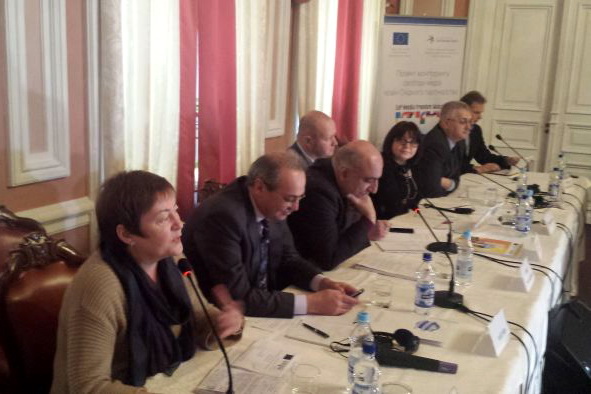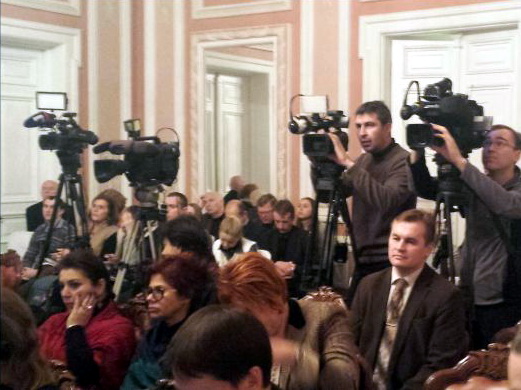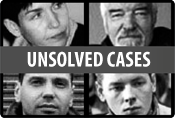Conference on EaP Countries in Kyiv
On February 9, a conference took place in Kyiv titled "Media Landscape in Eastern Partnership: conclusions and perspectives". Belarus is presented by Zhanna Litvina, chair of BAJ, Andrei Bastunets, lawyer and deputy chair of BAJ, and Mikhail Yanchuk, member of the Board of BAJ, official representative of Belsat in Belarus.

The conference concludes the results of a two-year project Media Freedom Watch held in Azerbaijan, Armenia, Belarus, Georgia, Moldova and Ukraine.
Many changes for two years, but not in Belarus
For the whole term of the project implementation, Belarus has stayed at the bottom of ratings compiled by 10 experts in each country. Recommendations, produced from the analysis of the situation, have not been followed anyhow by Belarusian authorities.
Lately, the distance between Belarus and Azerbaijan has shortened, but not due to improvements in Belarus, but rather due to aggravating situation in Azerbaijan. Armenia is stable on its fourth position, Ukraine – on the third, showing progress, and Moldova and Georgia were taking turns in the first and the second place. Now, Georgia is in the lead.
“Our project started in one geopolitical environment and ended in different,” said Boris Navasardyan, head of the Yerevan press club, one of the ideologists of the project.
Too much optimism harms the deal
Even leaders of the rating, Moldovan and Georgian representatives spoke of dangers of extensive optimism and trust to authorities who promise changes in the sphere of media freedom. Without step-by-step control by the public, their actions rarely end up with real improvements. “Even Georgia’s being in the first place does not mean that everything is fine here. It is just better than in other /countries compared/,” said Manana Jahua, from Green Wave association, Georgia.
“The example of Azerbaijan shows what happens when European institutions excuse some liberty to certain states,” remarked Arif Aliev, head of Azerbaijan Journalists’ Association. He said only 2-3 per cent of the whole national market are independent mass media, and more than a dozen journalists and bloggers are currently in jail. “Azerbaijan used to agree with the EU, but then slowed down the process of reforming, but now the authorities openly say “we have our own approach”, “the society is not ready” etc.”
Ukraine: a huge demand for a new country and new mass media
Constantin Kvurt, from Internews-Ukraine, mentioned three main challenges for mass media: aggressive information policy of Russia, lots of Russian citizens at responsible posts in mass media; and inadequacy of Ukrainian political elites to the new situation in the country. “Pliability, compromises, lack of lustration, plenty of special agents, - all this leads to problems in the media,” he said. “The consequence is failure of the media to perform its function as a transmitter between the establishment and the society.”
“Now, after the revolution of dignity, there is a huge public demand for a new country and new media. Those who will be able to change according to the demands, - they will survive.”
Sergiy Leschenko, former journalist of Ukrainsk Pravda, now a deputy of the Verkhovna Rada, member of anticorruption committee said that, in his view, there have been many changes in the sphere of free expression in Ukraine. On the one hand, violence against journalists has become almost norm, but an armed conflict is impossible without it, he said. There are positive changes, however: for instance, Parliament debates are more transparent, now any citizen can attend it, with prior registration. There is a plan to launch a good-quality public TV, as a counterbalance to TV channels subordinated to oligarch clans. There is much progress in developing independent online TV.
The deputy takes the creation of the Ministry of information policy with a pinch of salt. “Russia’s propaganda makes the authorities react in a certain way. But one should not fight propaganda with another propaganda – only with objective information. Besides, resources of Russian propaganda are unlimited, whereas all expenses for Ministries here are cut down, but still introduce one more Ministry. This is not sensible. Besides, it is a dangerous instrument in the hands of authorities. Tomorrow the situation might change, but the Ministry already exists.”

Belarus: chronical diseases and inability to stand new challenges
Experts concluded that the last place in the rating mainly owes to repressive legislation, said Zhanna Litvina: these are laws on defamation, discretization of state, activities on behalf of unregistered public associations, the law on state secrets, on counteracting extremism, and the amendments to the media law adopted slyly.
The lack of protection of freelancer journalists has become more sensitive.
“Besides, the soon-coming presidential campaign in Belarus will take place at the background of the Russian-Ukrainian conflict. Belarus felt well what the Russian propaganda machine is. State mass media are unable to react operatively to its advances, they are unable to formulate the position of its country,” she said.
“The problem of fighting propaganda has gone beyond the limits of one country, so EaP countries need to have one standing on how to take aback the “fighters of information wars” and consolidate around professional standards,” said Zhanna Litvina.





